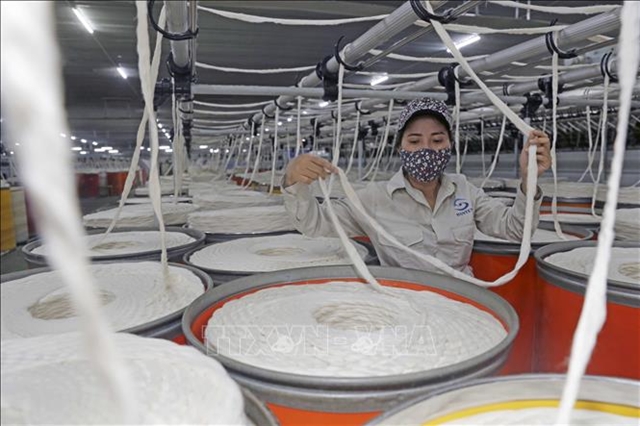 Economy
Economy


|
| Fibre production line at Ha Nam Textile Company Limited in Hà Nam Province. —VNA/VNS Photo Trần VIệt |
HÀ NỘI — Việt Nam is the world's sixth-largest fibre exporter and the world's third-largest exporter of textiles and garments - just behind China and Bangladesh.
Latest statistics from the General Department of Customs show that, by the end of the third quarter of 2023, fibre exports earned US$3.2 billion with more than 1.3 million tonnes of goods exported abroad, up 9.3 per cent in volume but decreasing 13.8 per cent in value compared to the same period last year.
Increase in quantity
Regarding the market, in September, fibre exports to China reached 77,459 tonnes worth more than $203 million, down 18.8 per cent in volume and down nearly 20 per cent compared to August 2023.
Overall, in the first nine months of the year, Việt Nam exported 647,862 tonnes of fibre to the Chinese market and earned more than $1.71 billion, up 18.1 per cent in volume but down 2.1 per cent in value over the same period last year. The export price reached $2,652 per tonne, down 17.1 per cent compared to the same period in 2022.
Korea is the second-largest export market of Vietnamese fibre. In September, fibre exports to Korea reached 10,898 tonnes with a value of more than $30 million, an increase of 0.6 per cent in volume and an increase of 2.8 per cent in value compared to August 2023. Overall, in the first nine months of the year, fibre exports to this market reached 101,880 tonnes and earned more than $284 million, down 5.78 per cent in volume and 24.2 per cent in value compared to the same period in 2022. The average export price reached $2,788 per tonne, down 19.65 per cent over the same period in 2022.
The US market ranked third. In the first nine months of 2023, Việt Nam exported 75,483 tonnes of fibre to the US with a value of more than $108 million, down 13.8 per cent in volume and 29.4 per cent in value over the same period. The average export price reached $1,443 per tonne, down 17.5 per cent over the same period in 2022 and less than half the export price to China or Korea.
Better raw material prices
In the first half of this year, business results of Vietnamese fibre industry enterprises have shown signs of clear improvement as the price of cotton raw materials has decreased significantly compared to the first half of 2022 and demand from the market has increased significantly, and demand from the Chinese market has increased again.
Member of the Board of Directors, General Director of Vietnam Textile and Garment Group (Vinatex) Cao Hữu Hiếu said that the market trend in the fourth quarter of 2023 had positive changes when the Fed did not raise interest rates in September but postponed it to the end of the year.
The US and Chinese markets recovered well, the purchasing managers' index (PMI) of these two markets were both above 50 points (higher than forecast). EU inflation in September also decreased by 4.3 per cent and in September Việt Nam's export turnover of goods increased by 4.6 per cent compared to the same period in 2022.
"Particularly for the fibre industry, the price of cotton put into production in the third and fourth quarters of 2023 is currently approaching the market price and is lower than the first six months of the year, helping the fibre industry be more effective," said Hiếu.
Ready to increase production plan in 2024
Vinatex representative also said that the overall market demand in 2024 is likely to improve compared to 2023, although the improvement is small as the total demand in 2024 is expected to still be 5-7 per cent lower than 2022. The fibre industry may have unexpected developments due to the application of stricter policies. However, Vinatex still proposes a scenario that the fibre industry in 2024 will increase by 10 per cent compared to 2023 due to the increased equipment mobilisation rate based on the forecast cotton price of $2.5-2.6 per kilo.
In addition, demand for common textile and garment industry products will increase in the last quarter of the year to serve festivals, so export activities of fibre enterprises are expected to be more vibrant, according to Hiếu. — VNS




